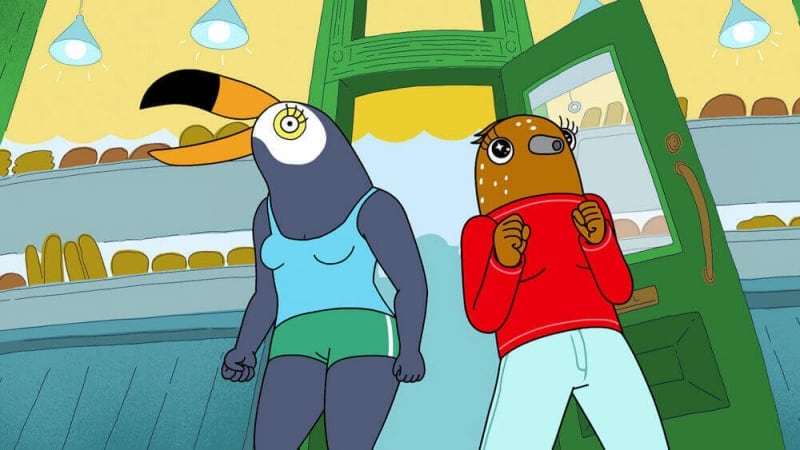Welcome to Previously On, a column that gives you the rundown on the latest TV. This week, Valerie Ettenhofer reviews the second season of Tuca & Bertie, the animated series that was canceled by Netflix and revived on Adult Swim.
The opening sequence of Tuca & Bertie is a perfect encapsulation of the series itself: a vibrant sugar rush of animation, centering a continual shot of the two protagonists—best friends and birds Tuca (Tiffany Haddish) and Bertie (Ali Wong)–exuberantly stomping down the road, legs splayed and arms set in a stance of determination. Layers of music and voices come together to turn the two womens’ names into a catchy, if fervent, hook. The entire short sequence epitomizes the series’ energy, and after two years away and a considerable amount of time spent in cancellation limbo, it’s an outright joy to dance along with Tuca & Bertie again.
Lisa Hanawalt’s series most often gains comparisons to Broad City (in its character dynamics) and Bojack Horseman (in its animation style), and while both are accurate points of reference, the series has proven itself unique with just a handful of episodes to date. When the second season opens, anxious office worker and aspiring baker Bertie is looking for the right therapist. Meanwhile, impulsive Tuca is navigating sobriety and the dating world while taking care of her ailing Aunt Tallulah (Jenifer Lewis). Tuca & Bertie’s first season was a bit of a Trojan Horse, frontloading with candy-colored hijinks before diving deep with a plot about Bertie’s experiences with sexual assault and harassment, yet it maintained a lighthearted current throughout. The four episodes of the second season available for review continue on this trajectory, spotlighting a refreshingly dynamic female friendship while maintaining a streak of frank humor.
Tuca & Bertie is one of the most visually creative series on TV right now. Hanawalt, who previously worked on Bojack Horseman as a production designer and producer, envisions a city that’s not just populated by talking animals, but also by sentient plants. The world’s animism is a source of constant surprise and delight, as when the mayor of a shadowy city turns out to be a rare and expensive flower. Tuca & Bertie’s second season rewrites the boundaries of its world even more than the first; in one episode Bertie brings an imagined alter ego out of her head and into reality, and in another, Tuca wanders the city at night and her surroundings are stripped down to little more than a sketch. Tuca & Bertie’s sense of imagination is often impressionistic, tied to the series’ emotional core; when Bertie tells a therapist she feels like a haunted house, she briefly turns into one before our eyes.
The series struck a cultural chord when it debuted in 2019, and fans were heartbroken when it was prematurely canceled by Netflix. The new iteration, on Adult Swim, bears none of the ill effects that sometimes come with a network change. These episodes feel like a natural continuation of the story we’ve seen, albeit reflective of our ever-complicated times. In one plotline, the question “what should happen to all the bad men?” is answered, in a characteristically thoughtful fashion, with a song in which men of all sorts sing about the privileges and perils of masculinity (“my dad told me boys don’t cry/so I keep my eyeholes dry”).
The series is timely, but in a way, it’s also long overdue. Tuca & Bertie creates excitement out of the everyday life of thirtysomething women, not through larger-than-life adventures like those of Abbi and Ilana in Broad City, but often through a distinctive, spirited take on the daily grind of adulthood. For every plot like the one where Tuca starts an impromptu dating competition game called Sex Bus, there’s another about whether or not Bertie will be able to stay awake long enough to watch a movie with Tuca and her boyfriend, Speckles (Steven Yeun). The series’ greatest achievement to date is its ability to be, at once, both emotionally grounded and wildly inventive.
Tuca & Bertie still has plenty of ground to cover; like much of one’s thirties, it’s filled with situations—among them, Bertie and Speckles’ romance, Bertie’s career, Tuca’s relationships—that only seem half-fulfilled. The episodes of the second season that are available for review are all immensely enjoyable, but the great series still seems far from its final form. Fueled by imagination and its creator’s clear passion, Tuca & Bertie is all but guaranteed to keep evolving in the most entertaining way for as long as we—and the TV powers that be—let it.

